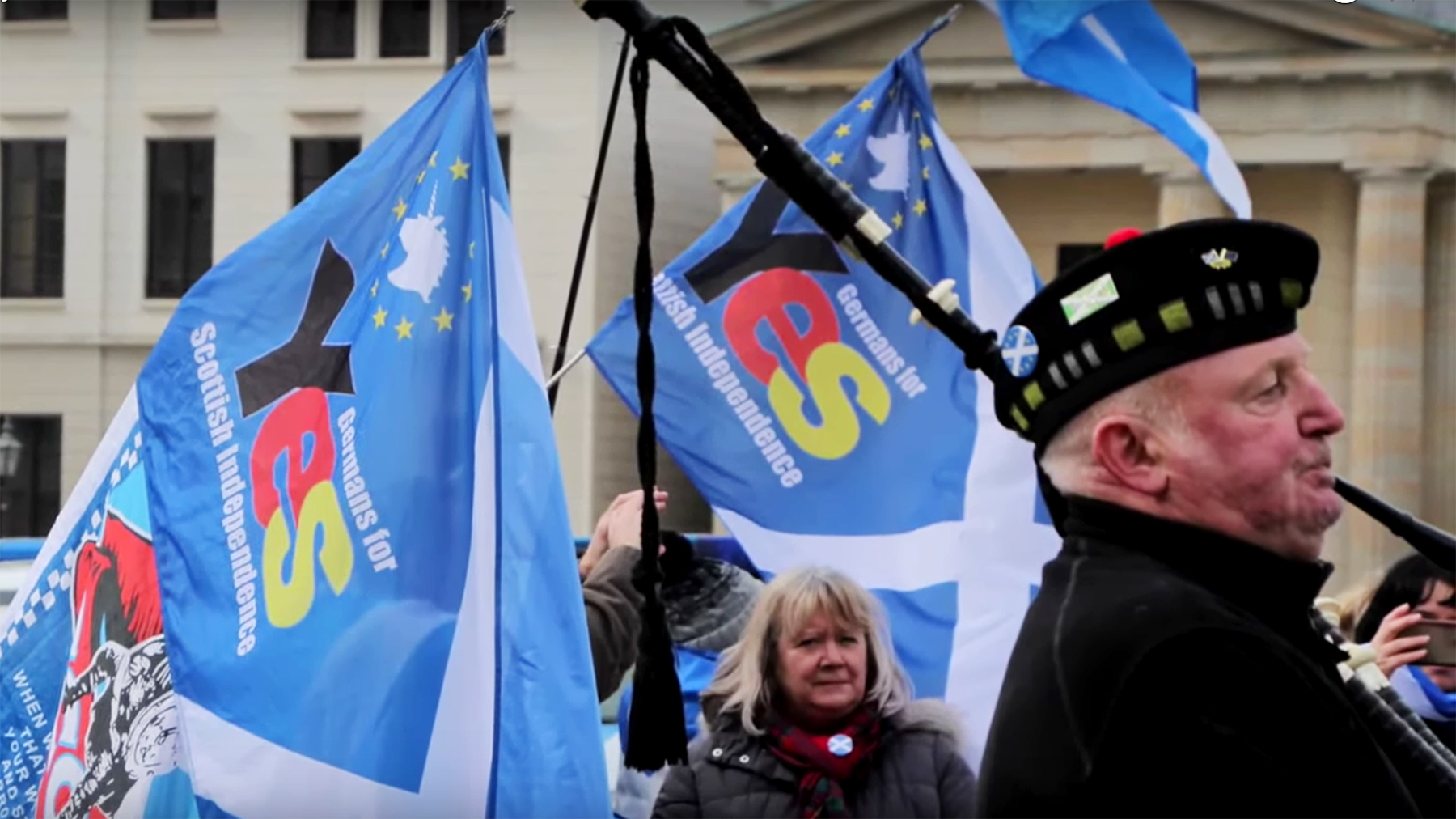Since Brexit, support for Scottish independence within Europe has started to grow. Why do campaigners feel this is important and what are they doing to encourage more of it?
Perched on the remote tip of the Mull of Kintyre, a four hour car journey from Glasgow, is the small port of Campbeltown. On a dreich July morning, winds from the Irish Sea whip through the seaside town, and a Scottish and German flag flutter side by side above a sea of saltires, bagpipes, and kilted protesters.
Beneath the flags stands Colin MacPherson, one of the 6,000 people who have travelled to this remote tip of the country to take part in a march for Scottish independence. Originally from Scotland but having lived in Bavaria for the past three decades, Colin helps run the campaign group ‘Germans for Scottish Independence’.
“We’re trying to get folk in Germany activated, and we’re starting to see it.” says Colin.
Colin makes sure to return to Scotland every few months to represent German support at grassroots independence events such as this. Here, just like at every other march he attends, Colin finds a quiet spot before the event kicks off to do a live Tweet for the group’s Twitter followers.
“What I try to do is keep people informed, both Germans living in Scotland… and for the Germans that are living in Germany who for whatever reason support Scottish independence,” says Colin, “Maybe they just like Scotland or they’ve got friends and family back in Scotland.”
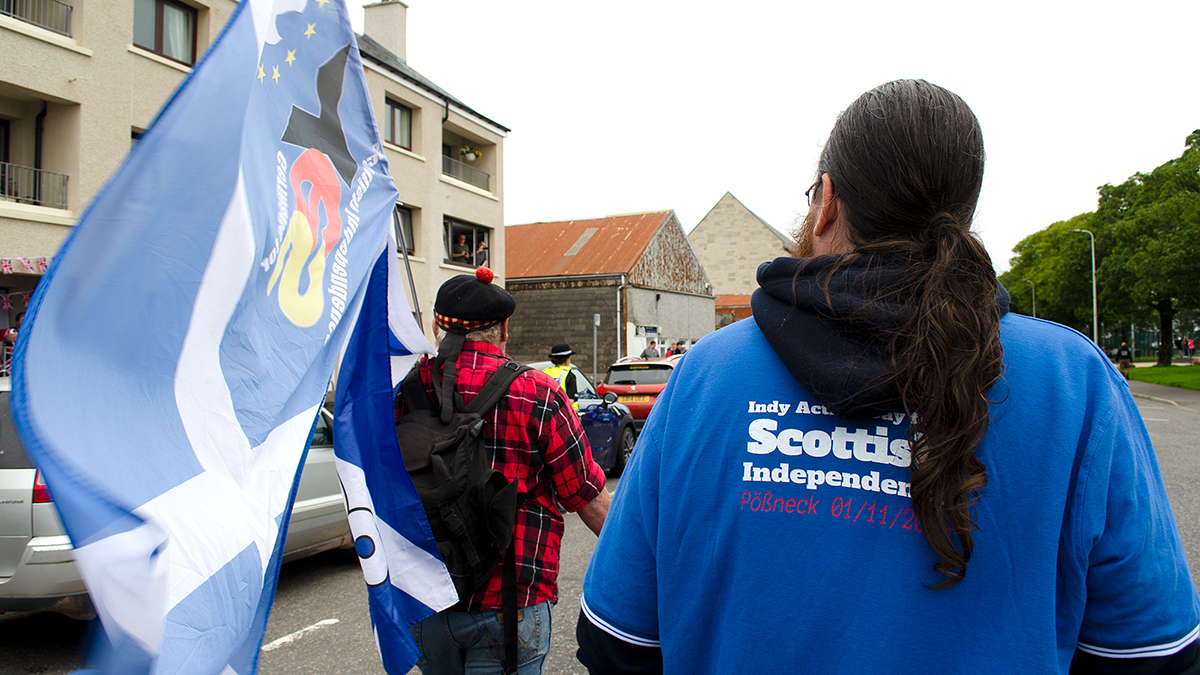
The group was founded by Colin’s friend and co-organiser Marco Görlach, prior to the previous independence referendum in 2014.
“In December 2012 I found a group called Americans for Scottish Independence on Facebook,” says Marco, “After some hesitation I founded Germans for Scottish Independence in January 2013.”
Born and raised in East Germany, and experiencing the fall of the Berlin Wall aged seventeen, Marco’s reasons for supporting independence came from the political turmoil he had experienced in his own country whilst growing up.
We were doing strip the willow in Berlin Alexanderplatz!
Colin MacPherson, Germans for Scottish Independence
Feeling lost in the aftermath of German reunification, Marco went travelling to escape his sense of isolation. What he experienced on his travels sparked his lifelong interest in Scottish independence.
“When I came over to Scotland, it felt like a homecoming,” says Marco, “The people, the scenery, and much more. It’s not possible to explain. It just felt like coming home.
“I wanted to give back some of the comfort and freedom I experienced in Scotland. Everything else is history.”
Based in Pößneck, a community of only 11,000 people in the German state of Thuringia, Marco’s hometown is an unlikely headquarters for a Scottish independence campaign group. But since the group’s formation in 2013, the town has held an annual festival in support of independence.
“Our aim is to raise awareness so that when the next referendum does come about folk actually are aware of the whole concept of Scottish independence… And we’re getting more international support.”
The group have also started taking their message to Berlin, having organised two recent marches through the German capital.
“We were doing strip the willow in Berlin Alexanderplatz!” says Colin, describing how marchers started a ceilidh in one of Berlin’s busiest public squares.
An important aspect of the international support the group wants is generated by grassroots events such as these marches. And crucially, since Brexit, SNP MEPs have started being able to rely increasingly on support from German politicians within the European Parliament.
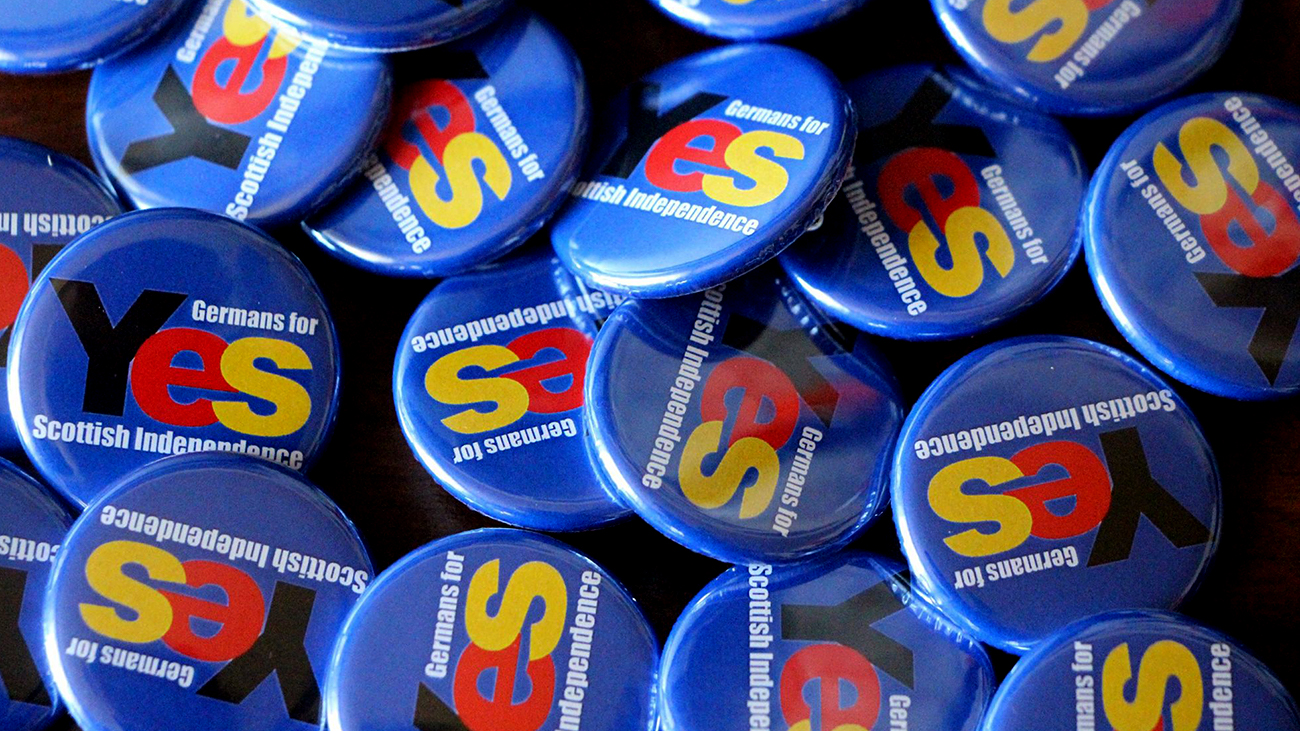
“We’ve got this strong voice in Europe… We’ve got Alan and Christian and Aileen, standing up for what Scotland wants with support, for instance, from the Greens,” says Colin, referencing Scotland’s Members of European Parliament, Alyn Smith, Christian Allard and Aileen McLeod.
Explaining what this means for the subject of Scottish independence within the European Parliament, he says, “The Greens and the European Free Alliance [of which the SNP is a member] sit as one fraction in the European Parliament. So, you’ve got German politicians actually coming out and supporting it.”
And this could be a crucial element of the Scottish independence movement’s long-term success.
‘Sovereign states are the gatekeepers in global politics,’ writes Ryan Griffiths, a specialist in secessionist movements, ‘They determine, for the most part, which secessionist movements will be recognized as independent states.’
And in order to achieve this international recognition, states have two options. They can either ‘target their central government’, as Scotland did with its 2014 referendum, or they can win support from the international community, allowing them to bypass the central government completely.
Griffiths uses Kosovo as the best recent example of this, a nation which declared independence from Serbia in 2008 without the approval of the central government of Serbia, but which received a majority vote of support from the United Nations.
Though Scotland successfully held a referendum in 2014, taking the first option of going through the central government, there is a possibility that the UK Government may not grant Scotland another referendum, despite Nicola Sturgeon’s recent claim that there will be another referendum in 2021.
It is this scenario that campaign groups such as Germans for Scottish Independence are preparing for, and why they are so excited by the prospect of support for independence among Europe’s politicians.
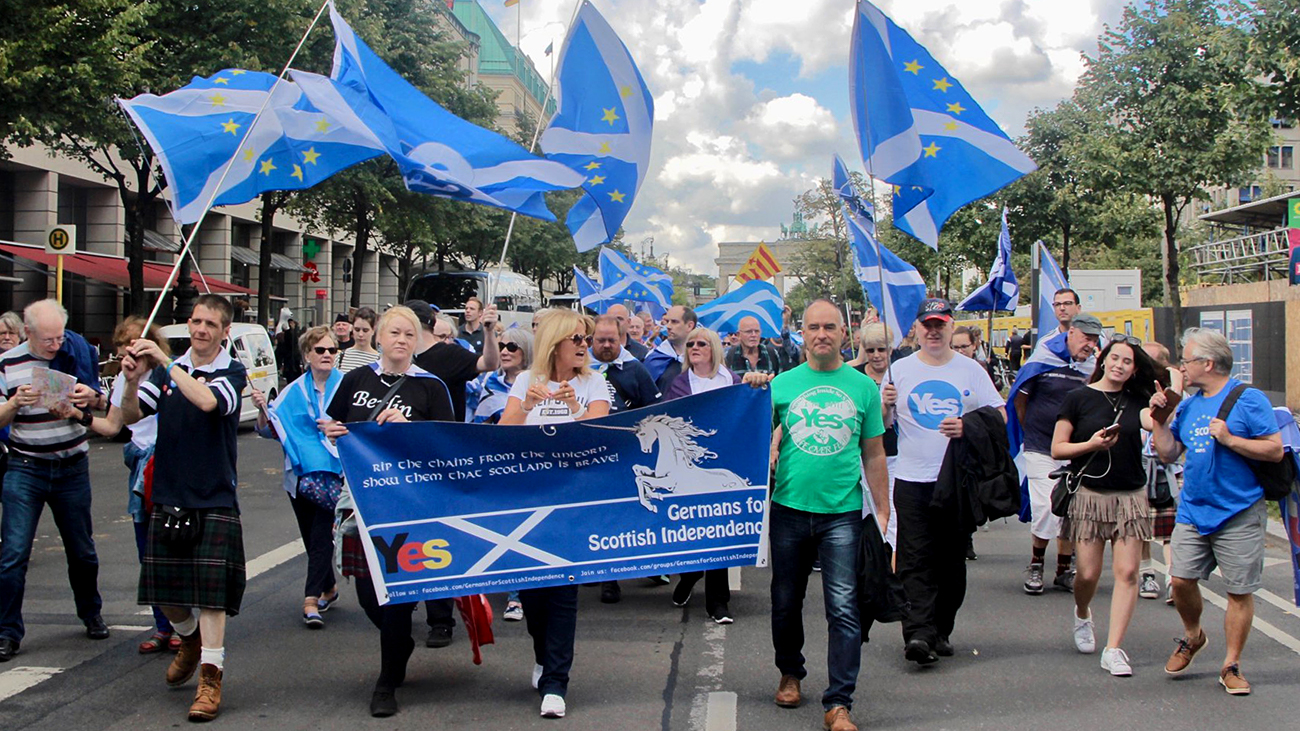
“I think we’re going to see a lot more politicians coming out and saying, ‘If this is what Scotland wants then they should do it, and we’ll welcome them back,’” says Colin.
This ‘welcome back’ to Europe is a key goal for the independence movement, the core of which see the future of an independent Scotland firmly within the EU. Therefore, winning the sympathy of European politicians is also vital for an independent Scotland’s ability to rejoin the EU in the future.
“In 2014, it was fairly clear that Mariano Rajoy in Spain or Francois Hollande in France were not in favour of an independent Scotland joining the EU and would veto it,” says Jérémie Fernandes, who works for the SNP.
Jérémie, originally from France, explains that he went from being a sceptic of independence to someone deeply involved in SNP campaigning due to the EU’s shifting attitude towards the prospect of an independent Scotland.
Picture gallery from the Campbeltown independence march:
“In 2014, I, myself was against independence based on this issue alone. Now, representatives of the Commission or the Parliament are saying that an independent Scotland would be welcomed in the European Union, so to most EU citizens in Scotland, independence means membership of the European Union.”
Therefore, gaining sympathy and understanding for Scottish independence within Europe is key, both in terms of securing an independent Scotland’s future within the European Union, and also in encouraging more voters like Jérémie that independence does not automatically mean Scotland must forfeit its EU membership status.
“Anyone can declare independence but to be effective international recognition is essential,” says Andrew Dowling, a specialist in secessionist movements at Cardiff University.
This is a realisation independence campaign groups based in Scotland have also had.
“I think part of [our] role is to shout back about independence into Europe,” says Ellen Höfer, creative director of European Citizens for an Independent Scotland, “Whenever we get asked for interviews or if we can help any project in any way that gets the word out further into the world, that’s fantastic. We take every opportunity we have.
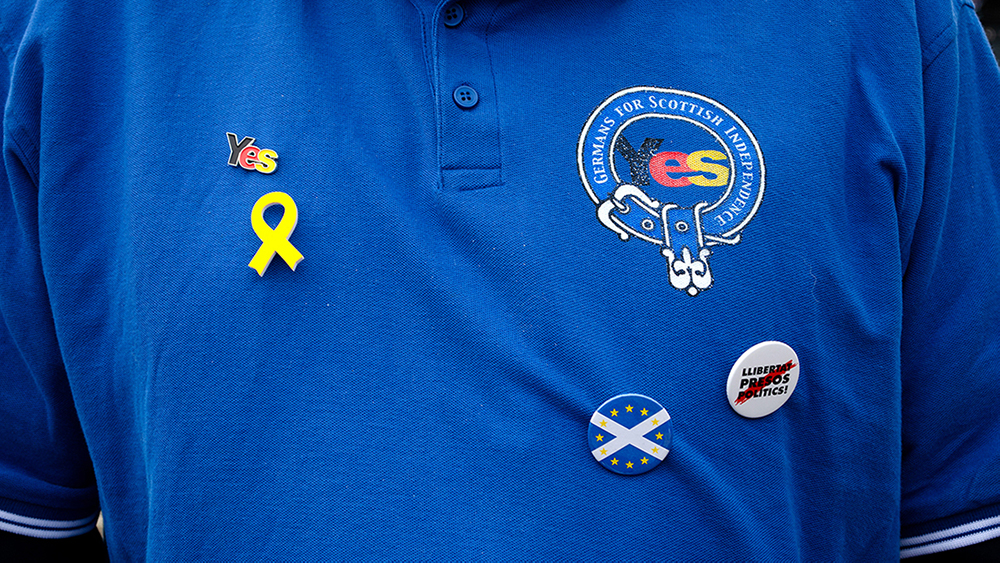
“We’ve petitioned the European Parliament and we decided, when we had written the text, that we should translate it into all of the European languages. We made a shout-out on Facebook and managed to have a three-tier translation system where three separate people would go over each of the translations for each of the languages.”
Like Germans for Scottish Independence, EUCIS see social media as one of the most effective means of attracting support and attention across the continent in a relatively easy way.
“I think this is the kind of stuff where we have to come at it from a social media angle… To have viral videos and that kind of thing going out to the rest of Europe,” says Ellen, And if we do it beautifully… then we will have the opportunity to reflect an inclusive and diverse image of Scotland and independence.”
This is a sentiment echoed by Fraser Wilson and Gary Paterson, founders of website Dear Scotland, who are currently in the process of planning an online space where Scottish people can send out messages to Europe. The aim is to encourage support for an independent Scotland within Europe.
“We want to get ordinary Scottish people sending messages out to Europe, saying what they feel, what it is to be European, and why they want Scotland to be, or continue to be, a part of Europe,” says Fraser, “It’s just a call out to Europe to be like, we are here and we want to remain.”
The first website they have created together, Dear Scotland, works on the same principle, but shares messages sent the other way – from those Europeans who have already been won over by the arguments for Scottish independence.
The original inspiration they had was that hearing from non-Scots about the benefits of independence could help convince those still unsure about how to vote.
“We’ve had contributors from France, from Germany, from the Netherlands, from Italy,” says Fraser, “A French girl spoke about her democratic concern for the state Scotland is in… not really understanding how Westminster could take this approach, not listening to Scotland’s voice and Scotland’s desire to stay in the EU.”
Some Europeans have gone much further in demonstrating their support for independence. Eva Gerber, from Germany, caused a stir on Scottish social media this summer due to her campaigning. Beginning in her home city of Würzburg, Eva decided to cycle up through Europe to Scotland in order to raise awareness of Scottish independence.
“It’s important to show my support for other European people… It’s for Scotland, it’s for Europe, it’s for all of us,” says Eva.
Having visited Scotland once, she fell in love with the country, and believes its fate to be intertwined with that of the European Union. Fittingly, the starting point for Eva’s trip, the village of Veithöchsheim where she is from, will be the exact geographical centre of the EU after the United Kingdom leaves in October.
In Germany’s hottest summer on record, she has cycled up through Germany and across the Netherlands before boarding a ferry to Newcastle. In total, it has taken her a fortnight to reach her destination – Glasgow. And throughout her entire journey, she has kept people back home up to date with her progress by posting a daily vlog for her Facebook followers.
“With social media and technology we can connect with each other,” says Eva, echoing Colin’s sentiments.
As well as her Facebook followers, Eva has managed to gather a fair amount of attention in the German media, including a television appearance on the Bavarian state broadcaster. Media appearances such as this, and positive press in general, are something campaigners believe could make all the difference in terms of winning the support of the public in Europe.
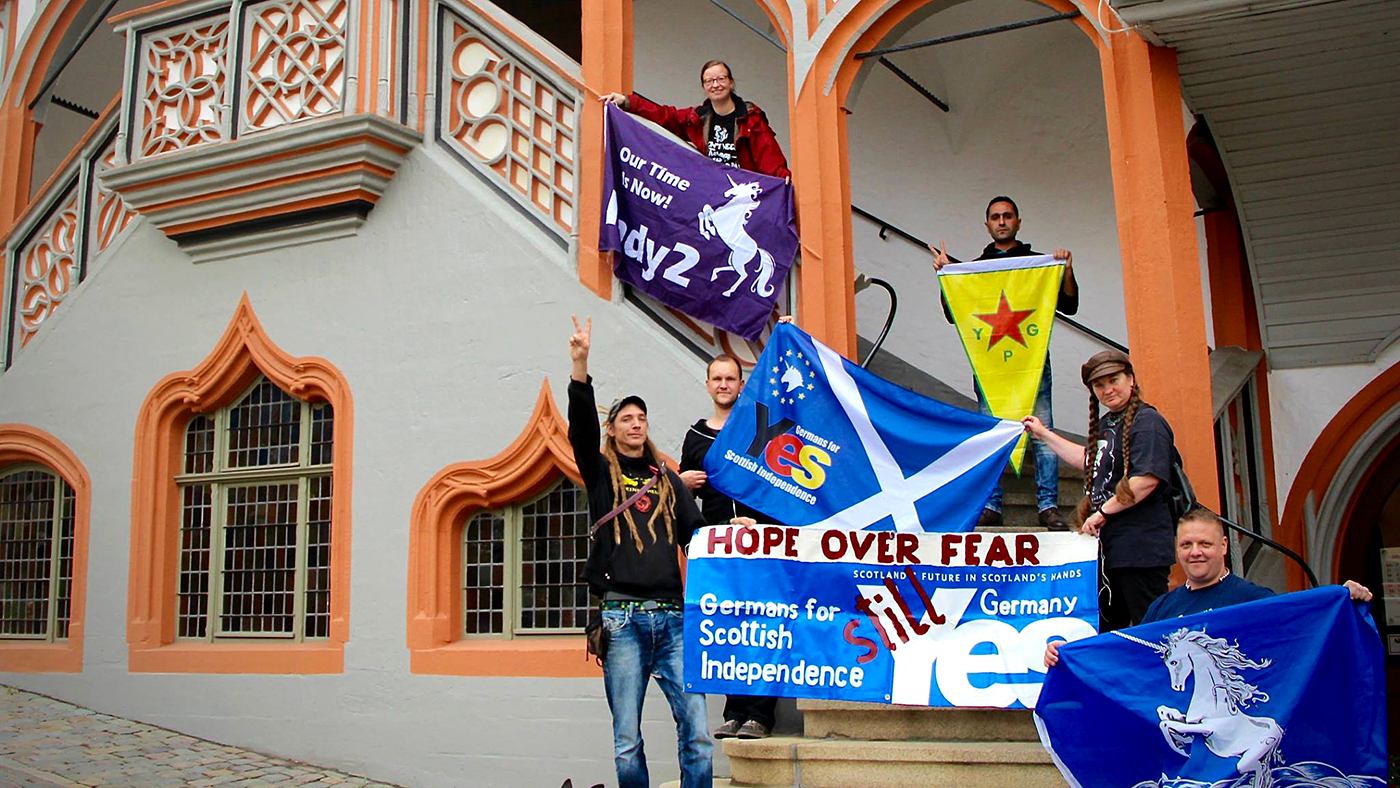
“Last time around we had the classic stuff. ‘Separatists’, and all the rest of it,” says Colin MacPherson, discussing the German media’s coverage of the 2014 referendum.
“But coincidentally, now, a good mate of mine is the digital media editor for the local paper so he’s pushing the odd article in there so that folk can know what’s going on.
“If you get reports in the local paper in Lower Bavaria then you’ve got reports in Thuringia where Marco has articles in the paper because he’s got the contacts there. Again, when it comes to it, then maybe attitudes are just a little bit fairer next time around,” says Colin.
It is these fairer attitudes which campaigners reaching out in Europe believe could be integral to the success of independence, ensuring that Scotland has a future within Europe.
“When we go independent and we’re going to want to be negotiating our way back into the EU, I think the more support there is, and knowledge there is, of Scottish politics currently across Europe, the easier that will be going forward,” says Fraser.
This is the challenge groups such as EUCIS and Germans for Scottish Independence have set themselves – to win support across Europe, in the hope it will help avoid the disappointment of 2014.
“It’s one of those things where every little thing counts, it’s like small cogs in a bigger wheel,” says Colin.
As the crowds in Campbeltown reach the end of their two mile march through the town, a sea of blue spills out of the town and into nearby fields, ready for the afterparty. The rain has begun pouring down now, but the mood is still jubilant.
Colin is spotted from across the field by one of the event’s organisers, his flag well known in independence circles. Colin is asked if would like to say a few words, and he accepts the microphone gladly.
“Friends, I can assure you that in Europe, we have your back… Last time they said ‘Europe doesn’t care about you.’ Europe will care, Europe does care.”
